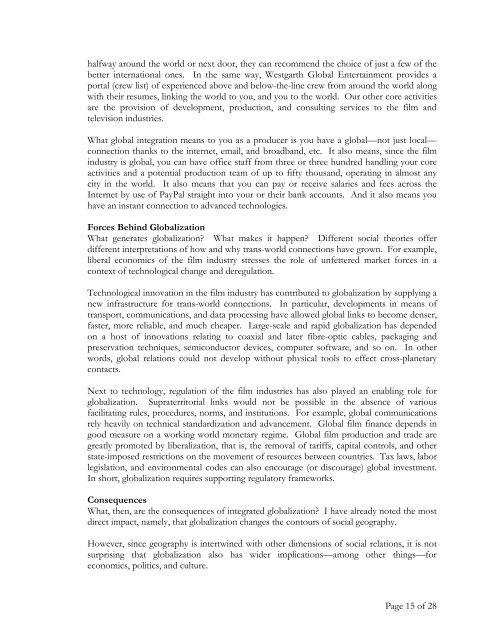MICHAEL WILDE - Westgarth Global Entertainment
MICHAEL WILDE - Westgarth Global Entertainment
MICHAEL WILDE - Westgarth Global Entertainment
You also want an ePaper? Increase the reach of your titles
YUMPU automatically turns print PDFs into web optimized ePapers that Google loves.
halfway around the world or next door, they can recommend the choice of just a few of the<br />
better international ones. In the same way, <strong>Westgarth</strong> <strong>Global</strong> <strong>Entertainment</strong> provides a<br />
portal (crew list) of experienced above and below-the-line crew from around the world along<br />
with their resumes, linking the world to you, and you to the world. Our other core activities<br />
are the provision of development, production, and consulting services to the film and<br />
television industries.<br />
What global integration means to you as a producer is you have a global—not just local—<br />
connection thanks to the internet, email, and broadband, etc. It also means, since the film<br />
industry is global, you can have office staff from three or three hundred handling your core<br />
activities and a potential production team of up to fifty thousand, operating in almost any<br />
city in the world. It also means that you can pay or receive salaries and fees across the<br />
Internet by use of PayPal straight into your or their bank accounts. And it also means you<br />
have an instant connection to advanced technologies.<br />
Forces Behind <strong>Global</strong>ization<br />
What generates globalization? What makes it happen? Different social theories offer<br />
different interpretations of how and why trans-world connections have grown. For example,<br />
liberal economics of the film industry stresses the role of unfettered market forces in a<br />
context of technological change and deregulation.<br />
Technological innovation in the film industry has contributed to globalization by supplying a<br />
new infrastructure for trans-world connections. In particular, developments in means of<br />
transport, communications, and data processing have allowed global links to become denser,<br />
faster, more reliable, and much cheaper. Large-scale and rapid globalization has depended<br />
on a host of innovations relating to coaxial and later fibre-optic cables, packaging and<br />
preservation techniques, semiconductor devices, computer software, and so on. In other<br />
words, global relations could not develop without physical tools to effect cross-planetary<br />
contacts.<br />
Next to technology, regulation of the film industries has also played an enabling role for<br />
globalization. Supraterritorial links would not be possible in the absence of various<br />
facilitating rules, procedures, norms, and institutions. For example, global communications<br />
rely heavily on technical standardization and advancement. <strong>Global</strong> film finance depends in<br />
good measure on a working world monetary regime. <strong>Global</strong> film production and trade are<br />
greatly promoted by liberalization, that is, the removal of tariffs, capital controls, and other<br />
state-imposed restrictions on the movement of resources between countries. Tax laws, labor<br />
legislation, and environmental codes can also encourage (or discourage) global investment.<br />
In short, globalization requires supporting regulatory frameworks.<br />
Consequences<br />
What, then, are the consequences of integrated globalization? I have already noted the most<br />
direct impact, namely, that globalization changes the contours of social geography.<br />
However, since geography is intertwined with other dimensions of social relations, it is not<br />
surprising that globalization also has wider implications—among other things—for<br />
economics, politics, and culture.<br />
Page 15 of 28


